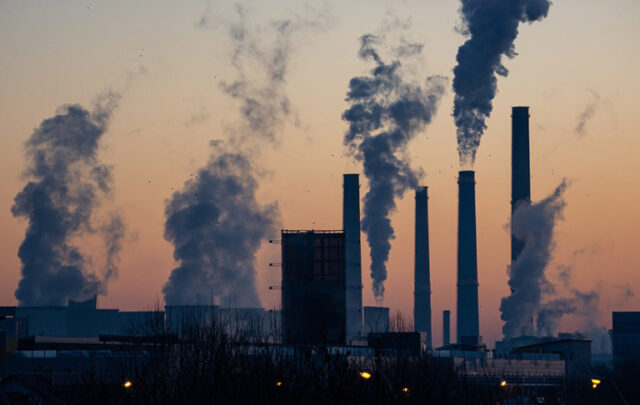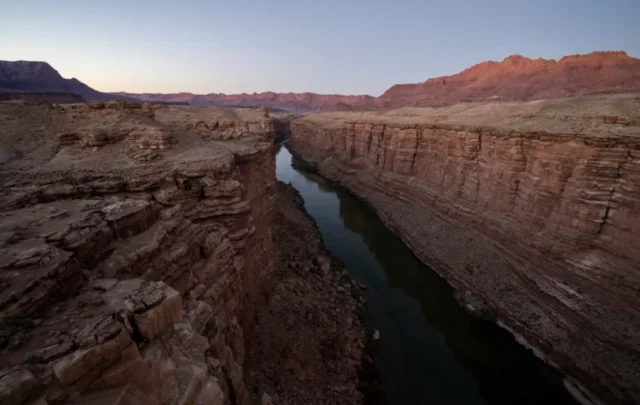Click on the headline (link) for the full text.
Many more articles are available through the Energy Bulletin homepage
Beware the bear trap
Jeremy Leggett, Guardian
Britain, like most of Europe, is at risk of being the target of Russia’s energy export weaponry
—
Yesterday, a “highly placed source” in Moscow was reported as saying the Kremlin intends to turn off the oil export pipeline to the EU on Monday, so great is Russian ire about the rhetoric in Brussels and warships in the Black Sea. If this is true, we are entering a whole new ball game in what has come to be called “energy security”. Even if the report proves false, the west should be on red alert about energy export weaponry.
Barely noticed in the runup to the crisis in Georgia, Russia signed a deal that gives its energy giant Gazprom control over gas supply from neighbouring Turkmenistan – one of three former Soviet satellite states around the Caspian sea on which Europe is pinning its hopes for a future gas supply. This Turkmen coup deepens Britain’s possible energy dependence on Russia as North Sea production falls away.
Coyly worded press releases on Gazprom’s website shine a faint light on its Kremlin-driven machinations but stop short of illuminating the whole story. Gazprom is on its way to achieving dominion over Caspian gas, and the Kremlin is making overtures to the other states in the region, Kazakhstan and Azerbaijan.
(30 August 2008)
Understanding Putin and the conflict in the Caucasus
John Toradze, OpEd News
To understand Vladimir Putin and his KGB/FSB cadre, it is necessary to back up to the situation of the period of Yeltsin’s rule of Russia after the breakup of the USSR. When Putin took office the situation in Russia was desperate, and the nation was on the verge disintegration.
The budget of the Russian Federation, circa 2000, was approximately that of New York City; police outside Moscow went years without paychecks, emergency medical care was unavailable without cash payment, and lawlessness ruled. I saw this in Russia and spoke to many Russians, most of whom had been forced to be criminals to survive.
… Russia was a debtor nation, literally laughed at and dismissed by the West. The situation was beyond any tears that could ever be shed from now to eternity.
And yet, in 1998, I was kissed by a huge old boxer, a Master of Sport, in a park far from Moscow. He was so poor the fly of his pants was sewn up with thread, and he asked me to please thank Ronald Reagan for breaking the regime, which I did, although I am not a republican. The time preceding the breakup had been terrible also, and many elders remembered their thirst for freedom. But as George Soros pointed out, freedom without choices is not freedom at all.
In response to this, a cadre of the former KGB worked together to take the country back. These were mostly honest, courageous and patriotic men that decided to rescue their nation. I have great respect for them, and if the USA ever falls into Russia’s straits, I can only hope that we would find men as good and capable. This movement had its roots as a carryover of the old guard in the immediate period after the breakup, which influenced decisions of the Yeltsin administration as it could.
… Looking ahead, what do Putin and his cadre of patriots see as challenges for Russia? He sees the USA, with its vast military might, with a huge military base in Baghdad, which is as close to Russia as Mexico City is to the southern border of the USA. He sees China, a nation with 7 times Russia’s population on his flank, rising economically with astounding speed, buying up the soybeans of entire nations like Argentina. He sees global warming scheduled to turn Siberia into a vast new farmland while virtually every other nation’s arable lands shrink. What he sees should make him uneasy indeed.
And that brings us to the Caucasus/Georgia region, and why Putin pressed the Chechen war after he took office. He did so for good reasons – access to the oil and the Caspian Sea. Georgia itself holds the keys to a quantum leap in Russian income and power.
… What is most important in the long run is that we need to think very carefully about how we can create linkages with Russia that will give Russia’s leaders an alternative to the present course. For the past 10 years, I have seen no other viable course for Russia to pursue if they are to survive as a nation. …
John Toradze is the pen name of a scientist who ran an office in Tbilisi, Georgia for 5 years and traveled widely in Russia the former USSR nations and nearby. I have authored chapters for books published by the West Point terrorism center on asymmetric warfare and methods. …
(30 August 2008)
Russia remains a Black Sea power
M K Bhadrakumar, Asia Times
If the struggle in the Caucasus was ever over oil and the North Atlantic Treaty Organization’s (NATO’s) agenda towards Central Asia, the United States suffered a colossal setback this week. Kazakhstan, the Caspian energy powerhouse and a key Central Asian player, has decided to stand shoulder-to-shoulder with Russia over the conflict with Georgia, and Russia’s de facto control over two major Black Sea ports has been consolidated.
At a meeting in the Tajik capital Dushanbe on Thursday on the sidelines of the summit meeting of the Shanghai Cooperation Organization (SCO), Kazakh President Nurusultan Nazarbayev told Russian President Dmitry Medvedev that Moscow could count on Astana’s support in the present crisis.
… From Moscow’s point of view, Nazarbayev’s words are worth their weight in gold. Kazakhstan is the richest energy producer in Central Asia and is a regional heavyweight. It borders China. The entire US regional strategy in Central Asia ultimately aims at replacing Russia and China as Kazakhstan’s number one partner. American oil majors began making a beeline to Kazakhstan immediately after the collapse of the Soviet Union in 1991 – including Chevron, with which US Secretary of State Condoleezza Rice was associated.
Unsurprisingly, Kazakhstan figured as a favorite destination for US Vice President Dick Cheney and President George W Bush has lavishly hosted Nazarbayev in the White House.
The US had gone the extra league in cultivating Nazarbayev, with the fervent hope that somehow Kazakhstan could be persuaded to commit its oil to the Baku-Tbilisi-Ceyhan pipeline, whose viability is otherwise in doubt. The pipeline is a crucial component of the US’s Caspian great game.
The US had gone to great lengths to realize the pipeline project against seemingly hopeless odds. In fact, Washington stage-managed the “color” revolution in Georgia in November 2003 (which catapulted Mikheil Saakashvili to power in Tbilisi) on the eve of the commissioning of the pipeline. The general idea behind the commotion in the South Caucasus was that the US should take control of Georgia through which the pipeline passes.
Ambassador M K Bhadrakumar was a career diplomat in the Indian Foreign Service. His assignments included the Soviet Union, South Korea, Sri Lanka, Germany, Afghanistan, Pakistan, Uzbekistan, Kuwait and Turkey.
(30 August 2008)
Russia and the Georgia war: the great-power trap
Ivan Krastev, openDemocracy
Europe has entered the new 19th century. The Russia-Georgia war of 8-12 August 2008 has acted as a time-machine, vaporising the “end of history” sentiment that shaped European politics in the 1990s and replacing it with an older geopolitical calculus in modern form.
An older calculus – but not a cold-war one. Indeed, though the conflict over South Ossetia has generated heady rhetoric of the cold-war’s return, the real constellation of power and ideology it has revealed is different from the days of superpower confrontation in the four decades after 1945. This is indeed time-travel, not a mere reversal of gears.
It is the singular element of a power-confrontation not accompanied by developed ideological polarisation that makes the Russia-Georgia war the first 19th-century war in 21st-century Europe
… The Kremlin may have emerged from the five-day conflict (and its longer and even messier aftermath) as the winner; but it may in the longer term turn out to be the strategic loser in its efforts to restore “spheres of influence” as the defining feature of European politics.
A triple failure
Mikheil Saakashvili, Georgia’s president, made a strategic miscalculation in starting a military operation in South Ossetia on the night of 7-8 August. He gambled and he lost. Georgia has lost too – lost Abkhazia and South Ossetia (the territories that had anyway managed to break free of control by Tbilisi in the post-Soviet wars of the early 1990s); lost its military infrastructure and the hope of rapid economic development. The ambition that impelled its post-2003 leadership – to be the Israel of the Caucasus – has backfired.
… Moscow too made a grave strategic miscalculation. The decision to follow the crushing of the Georgian assault on Tskhinvali by invasion of Georgia proper – though with no political plan, no local political allies to help remove Saakashvili, and no principle on which to build a Caucasus settlement after the war – meant that Russia’s actions were guaranteed to invite stinging international criticism. Russia has not offered anything, articulated any larger and inclusive project to make sense of its military campaign or enable it to reach out to neighbouring states and international partners. Russia has, in narrow terms, won; but it could yet turn out to be the biggest loser of the Georgian war.
Moscow’s strategic risk
True, Russia’s immediate military success is evident. The Kremlin has proved that the country can operate again as an effective (if crude) military power. The war was popular with the Russian public too; for many Russians who still live with the traumas of the 1990s, this small victorious war was a long-awaited reversal of almost two decades of political humiliation. Its short-term effect is thus to strengthen the legitimacy of the Vladimir Putin-Dmitry Medvedev regime.
But to highlight the psychological aspect of the war for Russians is also to underscore its 19th-century character – for the issue at stake was less national territory than national sentiment, which in 19th-century politics played almost the same role that ideology came to do in the 20th century (and in both cases could cause wars as well as justify them).
Ivan Krastev is chair of the Centre for Liberal Strategies in Sofia, Bulgaria. He served as the executive director of the International Commission on the Balkans, chaired by Giuliano Amato.
(31 August 2008)
UPDATE (Sept 1). Just added this one. -BA





